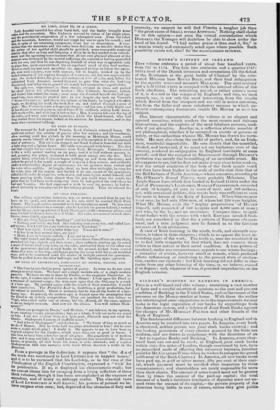MOORE'S HISTORY OF IRELAND.
THIS volume embraces a period of about four hundred years, from 787 to 1194. The first two centuries and a quarter (787- 1016) treat of the Danish invasions and occupations till the defeat of the Northmen at the great battle of Clontarf by the cele- brated Milesian hero BRIAN Boise, and their final subjugation by the equally renowned monarch MALACHI. The next century and a half (1016.1168) is occupied with the internal affairs of the Irish chieftains. The remaining perael, or rather bixteeil years of it, is devoted to the conquest by England : and this, we need scarcely say, is not only the most interesting, from the results which flowed from the conquest and are still in active opetation, but from the fuller and more satisfactory manner in which au- thentic contemporary documents enable Mr. Monett to treat his subject.
One literary characteristic of the volume is an elegant and spirited narrative, which renders the most remote and dubious transactions, and the exploits of the most fabulous persons, read- able if not attractive. Another is, a reflection always sensible if not philosophical, whether it be occupied on events or persons or policy, or the authorities whence Mr. MOORE has drawn his mate- rials. He may also claim the credit of perfect, and, for an Irish- man, wonderful impartiality. He sees clearly that the unsettled, divided, and backward, if we must not say barbarous state of the country, rendered its subjugation by England inevitable at some period; and that the conquest by STRONGBOW through DERMOT'S invitation was merely the forestalling of an inevitable event. He also appears to see, but he does not make it very clear to his readers, that the actual condition of the body of the Irish people coulct not then have been higher in the scale of civilization than that of the Red Indians of North America,—whose ancestors, according to Mr. O'Betest's Round Towers, were probably Milcsians. The Anglo-Saxon force which first landed in Ireland (1169) under the Earl of Pest BROKE'S Lieutenant, ROBERT FITZSTEPHEN, consisted of only 30 knights, GO men in coats of mail, and 300 archers; yet, with occasional driblets, this scanty body was sufficient to turn the scale in favour of the King of Leinster. When STRONG BOW went over, he had only 1200 men, of whom but 200 were knights. What Mr. Montle calls the " mighty preparations" of HeNrce himself, only consisted of 500 knights and 4,000 men at arias; and who, by the by, tact no resistance. Compare these
iimigni-
ficant bodies with the armies with EDWARD invadad Scot- land, not considered in that day a pattern of European advance- ment, and a true judgment may be formed as to the fabulous accounts of Irish civilization.
A view of Irish learning in the ninth, tenth, and eleventh cen- turies, is taken in three chapters ; which to us appear the least in- teresting parts of the work. The truth is, men are constituted so as to feel little sympathy for that which does not concern them either in their nature or their social condition. A true picture of mankind, under any circumstances, appeals to our innate feelings: a narrative of events, however small or remote, which produced effects influencing or conducing to the present state of civiliza- tion, excites our curiosity : but Irish learning did not differ in cha- racter from any other learning of the time, or, we believe, exceed it in degree; and, whatever it was, it perished unproductive on the English invasion.


























 Previous page
Previous page